Keto Diet is basically a low carbohydrate method of eating in which you burn fat for fuel. When you limit your carb intake, your body turns to the stored fats for energy thereby resulting in ketone production. Since there are various low-carb diets, people often confused keto with other low-carb diet. But just because a diet involves low-carb intake does not necessarily mean it is keto. The differences in the consumption of the macronutrients will help you to determine if the diet is really a ketogenic diet.
So what about Keto diet and exercise?
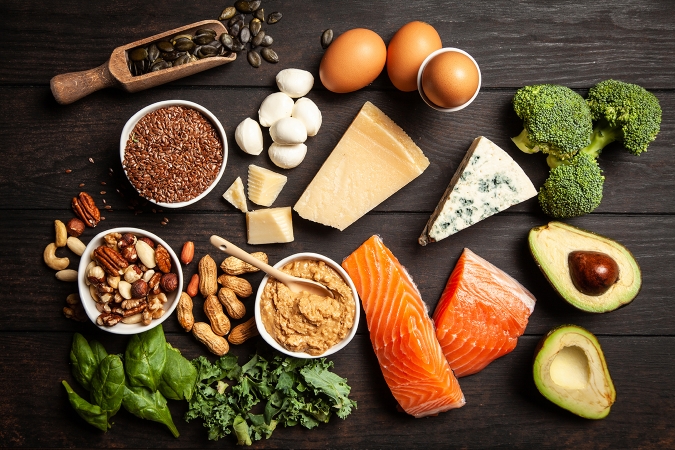
Macronutrients
What are the macronutrients? Macronutrients are crucial essential nutrients consumed by humans in massive quantities to provide the required energy to the body cells. The three primary macronutrients are:
Carbohydrates:
Limiting your carb intake allows your body to enter and maintain a ketogenic state. If you consume too many net carbohydrates your body will switch to burning the carbohydrates instead of burning fats, and you can kick your body out of ketosis. Carbohydrates are considered a limit, you do not need to try and hit this macro.
Fats
Since you are restricting the amount of carbohydrates you consume. The majority of the energy your body needs will come from fat. Keto is often referred to as a “high fat” way of eating but remember, if you are looking to lose weight, you are going to want your body to use some of its own stored fat for energy and not just the dietary fat you are feeding it. Let your body provide the “high fat”. You do not need to avoid fat, but you do not necessarily need to target fat either. Your fat macro should be considered a limit.
Proteins
Protein is THE MOST important macronutrient in your body. It is not only used to build muscles. All the cells in your body are made up of protein: muscles, bones, organs, tissue, even hormones. Protein degrades daily, and since your body cannot store protein for later use in the same way it can store fat, it is important to get at least enough protein per day. Adequate protein intake is needed by the body to properly repair and build. Protein intake is mostly lean mass, and context dependent, so remember that while 90g may be adequate for someone with a little lean mass, it may be too low for someone who has more muscle or is larger. Your protein macro should be considered a target you want to hit.
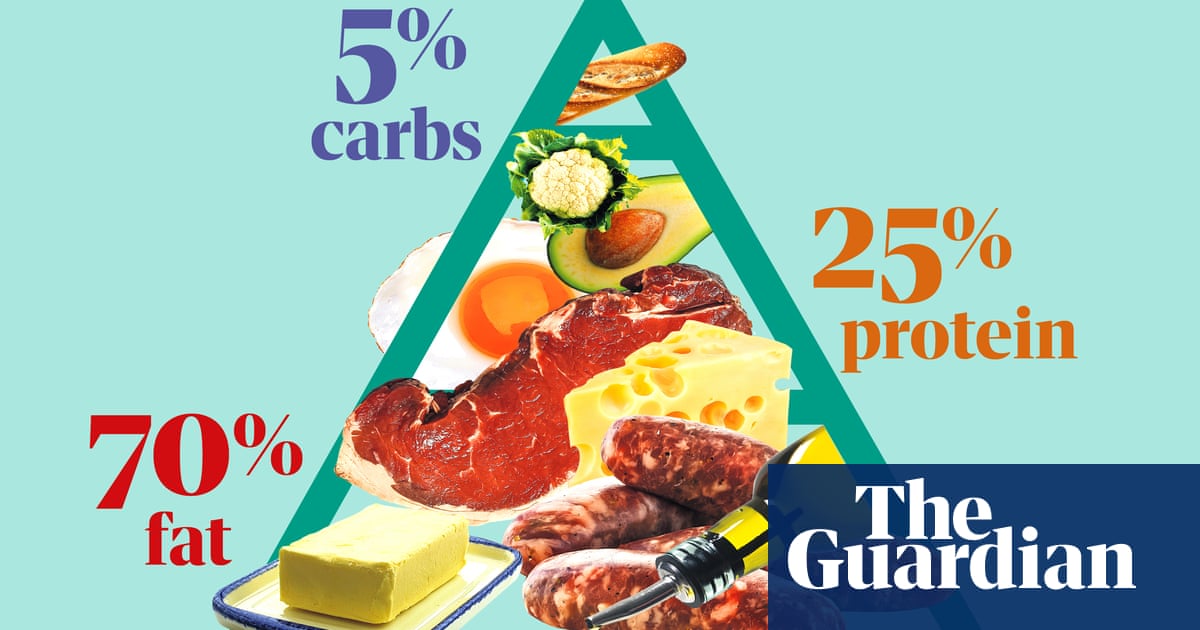
Source: The Guardian
So what Macronutrients should I take?
A ketogenic diet will be high on fat, have moderate quantities of protein and extremely low carbohydrates. The standard Ketogenic diet comprises of 80 percent fat, 15 percent protein and 5 percent carbohydrates.
Does Keto Diet Make You Lose Weight?
Unfortunately, a keto diet does not guarantee weight loss. Ketosis is a tool that makes maintaining a calorie deficit much easier because you are not constantly fighting hunger. Anecdotally, once some people incorporate keto in their diet, they feel satiated on fewer calories – which results in easier weight loss. However, others find they can still easily overeat on keto and will need to track and measure their calories to maintain a deficit. It is important to determine which method works best for you and your goals.
What to eat?
It
is important to begin your diet with natural and whole single-ingredient foods.
You can include any or all of the following food items to your keto food list.
Vegetables that grows above the ground:

- All the leafy green vegetables
- Cauliflower
- Broccoli
- Cabbage
- Zucchini
- Avocado
- Bell peppers
- Mushrooms
- Asparagus
- Peas
- Beans (Green, black)
- Tomatoes
- Lettuce
- Kale
- Cucumber
- Brussels Sprouts
- Celery
- Eggplant
- Artichokes

Other Vegetables
- Onions
- Garlic
- Ginger
- Radish
- Turnip
Healthy Fats
- Avocados
- Pumpkin seeds
- Pistachios
- Chia Seeds
- Flaxseeds
- Coconut oil
- Olive oil
- Avocado oil
- Pecan nuts
- Macadamia nuts
- Almonds
- Brazil nuts
- Walnuts
Fruits

- Strawberry
- Blackberry
- Raspberry
- Plum
- Cherries
- Peach
- Mandarin
- Cantaloupe
- Kiwi
- Lemon
- Coconut
Meatless Proteins
- Seitan
- Tempeh
- Tofu
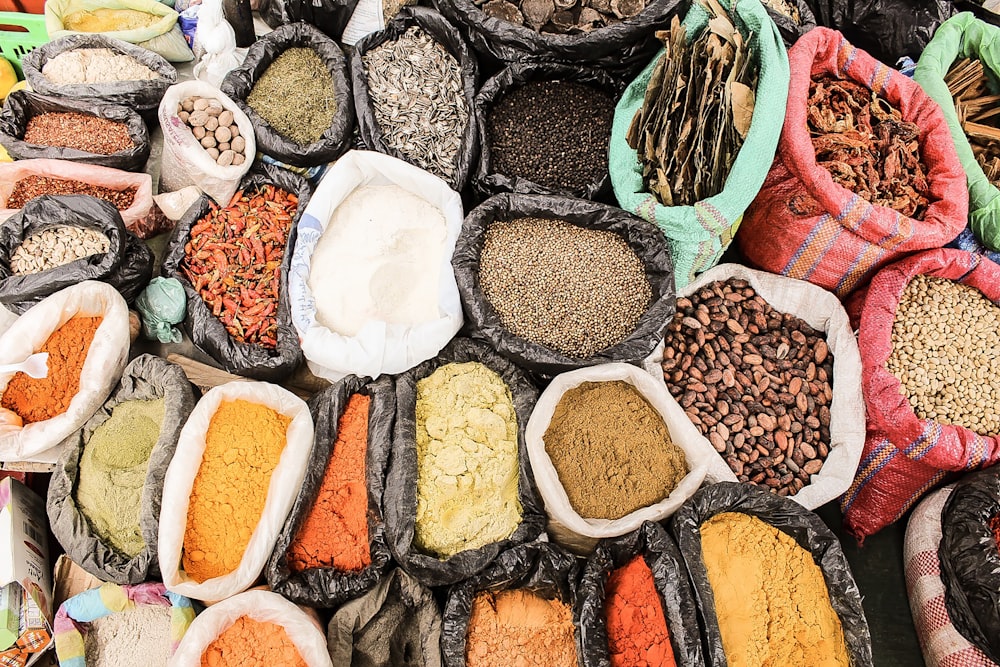
Condiments
- Pepper
- Herbs
- Salt
- Spices
- Horseradish
- Aioli
Meat
- Grass-fed & organic meat
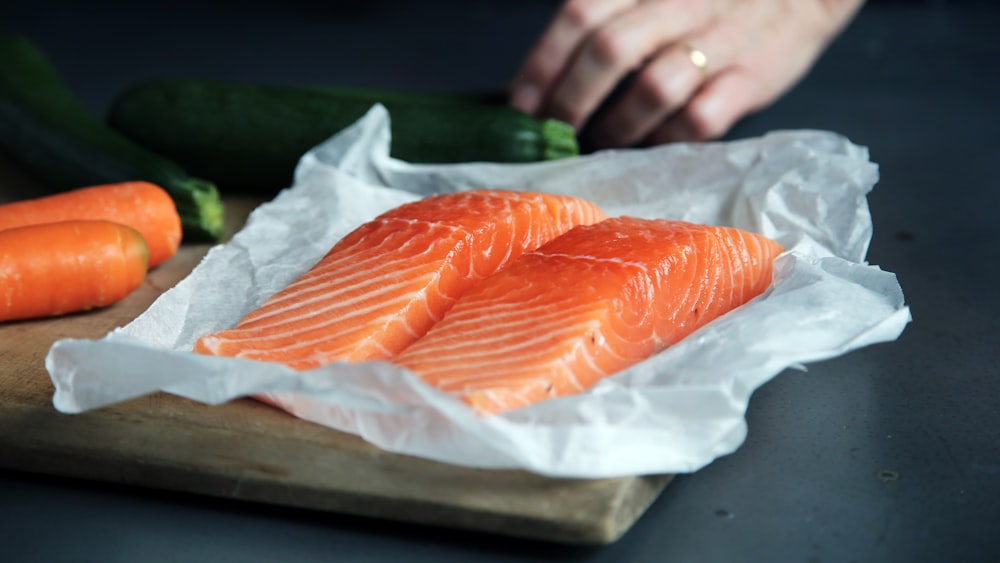
Seafood & Fish
- Tuna
- Salmon
- Mackerel
- Trout
- shellfish

High-fat dairy products
- Heavy cream (for cooking)
- Grass-fed cream and butter
- High-fat yogurt
- High-fat unprocessed cheese
- Cheddar
- Mozzarella
- Blue
- Goats cheese (optional)
What to drink?
- Water (plain, sparkling, iced, hot, natural-flavored, salted)
- Coffee (no sugar, cream or milk)
- Tea (herbal, black, green, mint, orange pekoe)
- Bone broth
- Vegetable stock
What not to eat

- Candy
- Cookies
- Sweets
- Donuts
- Cakes
- Breakfast cereals
- Frozen treats
- Chocolate bars
- Maple syrup
- Agave nectar
- Honey
- Artificial sweeteners (avoid or limit the usage)
- Smoothies
- Ice creams
- Sugary snacks
- Beers
- Margarine
- Tubers & root vegetables
- Processed foods
How do I know how much to each?
To know how much you can eat, you must calculate your personal macros (carbs, protein, and fats) using a macro calculator such as this one.
Can I do exercise while on a keto diet?
Of course. Any diet with exercise will yield you better results than the diet alone. Some people do report increased energy levels while doing a ketogenic diet However, despite insistent claims of superiority by ketogenic diet advocates, the vast body of research shows that Ketogenic diets are as effective as other diets, if they can be adhered to, and if protein calories are matched, but keto is no more effective for weight loss than any other diet.
Effectiveness in the long term also depends on whether an individual likes the diet and can stick with it as a lifestyle. With a minimal carb intake, keto is very restrictive. Some people find the richness of the high fat that’s allowed make it tolerable or even enjoyable, but for many others, the removal of carbs make it intolerable, not enjoyable and impossible to stay on for long, let alone adopt as a lifestyle.

What is the effect of Ketogenic diets on lean body mass?
Some research suggests that more lean body mass (all lean body mass – water, glycogen and protein) is lost on ketogenic diets compared to other diets. However, adequate protein on LCHF diets combined with progressive resistance weight training will likely prevent most muscle loss. If a keto diet were followed with low protein and no weight training, I would be watching for muscle loss.
Are keto diets ok for anaerobic / strength / physique athletes?
Some strength or physique athletes seem to do okay on keto. But the weight of the scientific evidence suggests that keto is outperformed by more conventional diets that have more carbs. More research is needed in this area, especially on long term effects and the effect at maintenance or surplus calories. On that note, it’s worth considering that if a LCHF diet does heavily suppress appetite, that would be good for weight loss, but would actually make it difficult to achieve a surplus, and thereby make it a poor choice for muscle gaining programs.
What about aerobic athletes and endurance athletes? Is keto okay for endurance athletes?
Keto seems to be outperformed by more conventional diets with higher carbs, but some endurance athletes seem to be able to “run on fat” okay, especially in longer, less intense events. There is also novel, but legitimate research going on right now regarding carbohydrate periodization and “training low while competing high” (in carbs). However, most endurance coaches don’t recommend keto or LCHF diets. Endurance athletes on keto appear to be the exception, not the rule.
Is Ketogenic diet for everyone?
The Ketogenic diet or the keto diet is not suitable for everyone. Experts suggest that people with certain medical conditions should not follow the keto diet.
Anyone with one or more of the following medical conditions should not get into ketosis:
- Kidney Failure
- Fat digestion disorders (pancreatitis, gallbladder disease, gastric bypass)
- Genetic metabolic defects
- Beta-oxidation defects
- Fatty acyl dehydrogenase deficiency
- CPT I/II deficiency
- Pregnancy
- Liver functional disorders
Side Effects of Keto Diet
When you start with the keto diet, you will feel weak and exhausted for the initial two to three days, as your blood glucose levels are low. Either your body is yet to enter into ketosis mode or the ketone production has not reached a stage where it can provide enough fuel to your brain and body. This particular state of your body can lead to a series of potential side effects. These side effects lead to keto flu, and the common symptoms are:
- Fatigue
- Headache
- Muscle cramps
- Dizziness
- Nausea
If the food you consume does not give your body the required amount of macronutrients and micronutrients, you tend to develop other symptoms that are ahead of the keto flu.
Certain other symptoms that people experience after the adaptation period are:
- Hair loss
- Constipation
- Elevated cholesterol levels
- Increase in blood triglycerides
- Bad breath
- Gallstones
- Exhaustion and tiredness that makes it difficult to maintain your physical performance
You will need to provide your body with adequate micronutrients and enough calories to overcome these symptoms. When you reduce the vegetable and fruit consumption in a keto diet because of the high-carb content, you are not consuming enough fiber content, which leads to vitamin deficiency. It is also possible for the keto diet to alter the way your kidneys work – they may excrete more electrolytes such as sodium and potassium. In such cases, you need to include supplements to reduce the imbalance of the electrolytes in your body.
Your keto diet is more effective if your carb intake is extremely low – a strict keto diet will want you to consume less than 20 grams of net carbs in a day.
Tools of the Trade:
- My Fitness Pal – A web based diary and also mobile app to log your food.
- A Comprehensive Guide of Acceptable Foods and their Net Carbs
- Doctor’s Discussion of Keto – Andreas Eenfeldt, M.D. discusses the parameters of Ketogenic Diets
- The internet- There’s tons of information and researches out there. Go crazy!

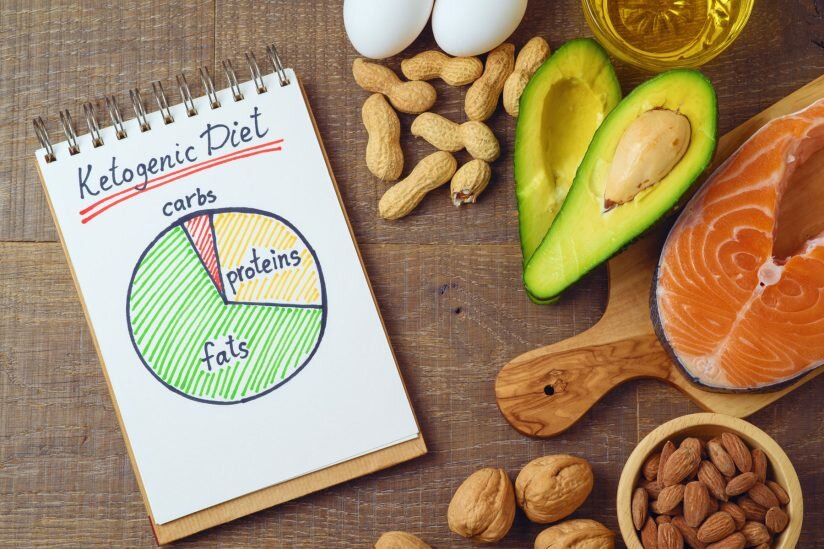
Приобретение диплома ПТУ с сокращенной программой обучения в Москве
купить семена через интернет магазин https://www.semenaplus74.ru .
капельница от запоя капельница от запоя .
Привет!
Мы готовы предложить дипломы.
tapatalk.com/groups/dzerjinsky/viewtopic.php?f=2&t=33092&from_new_topic=1
Как купить диплом о высшем образовании с минимальными рисками
chacom.ru/archive/pages/kak_vubrat_i_kupit_diplom_rossiyskogo_vuza_bezopasno_i_legalno
Здравствуйте!
Мы изготавливаем дипломы психологов, юристов, экономистов и прочих профессий по доступным тарифам.
snipesocial.co.uk/blogs/370679/Открытие-возможностей-
Здравствуйте!
Мы можем предложить дипломы психологов, юристов, экономистов и прочих профессий по выгодным тарифам.
tnfnorth.com/memberlist.php?sk=m&sd=a&first_char=i&start=25
Как не попасть впросак при покупке диплома колледжа или ПТУ в России
twittx.live/read-blog/4701
Аттестат школы купить официально с упрощенным обучением в Москве
Процесс получения диплома стоматолога: реально ли это сделать быстро?
Здравствуйте!
Мы изготавливаем дипломы любых профессий по приятным тарифам.
s-s-o.ru/forum.php?PAGE_NAME=profile_view&UID=52952
Привет!
Приобрести диплом университета .
telegra.ph/diplom-korochka-kupit-08-13-5
Source:
– https://evgenia-parisiena.ru/pravilnaja-ssylka-onion-kraken.html
правильная ссылка онион кракен
Source:
– https://tamm-kirov.ru/kraken-cherez-tor.html
кракен через тор
Каждый из вариантов нельзя назвать на 100% надежным – в интернете действует много мошенников, создающих копии Гидра онион, которые направлены на хищение аккаунтов и средств со счетов. Чтобы не попасть в лапы к мошенникам, каждому клиенту Гидры стоит знать, что ссылка на официальный сайт выглядит следующим образом: hydraruzxpnew4af.onion. Любое изменение адреса, будь то цифра или буква, свидетельствует о том, что перед вами зеркало Гидры или ссылка на сайт фишеров.
Source:
кракен онион
кракен онион
Source:
– https://kra-5.cc
кракен сайт
Source:
кракен сайт
кракен сайт
Как официально приобрести аттестат 11 класса с минимальными затратами времени
Можно ли быстро купить диплом старого образца и в чем подвох?
Привет, друзья!
Получить диплом института
купить диплом в кирово-чепецке
Привет, друзья!
Мы изготавливаем дипломы психологов, юристов, экономистов и других профессий по доступным ценам.
recept-food.ru/diplomyi-dlya-budushhih-liderov
Как избежать рисков при покупке диплома колледжа или ПТУ в России
igpsclub.ru/social/read-blog/5872
Добрый день!
Мы готовы предложить дипломы.
x70795vj.beget.tech/2024/01/20/hotite-kupit-attestat-11-klassov-lyubogo-goda
Как избежать рисков при покупке диплома колледжа или ВУЗа в России
belgorod.doguran.ru/timthumb/pages/kak_kupit_diplom_s_dostavkoy_v_vash_gorod___poshagovaya_instrukciya
Добрый день!
Мы изготавливаем дипломы любой профессии по выгодным ценам.
petkit.com.cn/member/index.php?uid=ehalipa&action=viewarchives&aid=6644
Source:
– https://www.talk-finance.co.uk/
Truly lots of beneficial info
Source:
– https://gofishing01.ru/ssylka-na-kraken-v-tor-brauzere.html
ссылка на кракен в тор браузере
Source:
– ссылка на кракен тор браузер
ссылка на кракен тор браузер
После ознакомления, необходимо кликнуть по кнопке «Согласен» и указать страну и город, где вы хотите совершать покупки и получать товары. Попав на главную страницу сайта Hydra, клиенту останется выбрать заинтересовавший его магазин, кликнуть по интересующему товару и совершить покупку, предварительно пополнив счет.
Source:
кракен 2kmp
кракен 2kmp
Source:
– https://kra-7.cc
кракен сайт
I think that everything said was actually very logical. However, think about this, suppose you typed a catchier title? I ain’t saying your information isn’t good, however what if you added something that makes people desire more? I mean %BLOG_TITLE% is a little vanilla. You could glance at Yahoo’s front page and note how they write article titles to get viewers interested. You might add a related video or a pic or two to get readers excited about what you’ve written. In my opinion, it would bring your website a little livelier.
https://roofers-msk.ru/
Вход на Гидру – переходим к самому интересному
Source:
кракен рабочая ссылка
кракен рабочая ссылка
Source:
– https://variator-msk.ru/kraken-2krn-cc.html
kraken 2krn cc